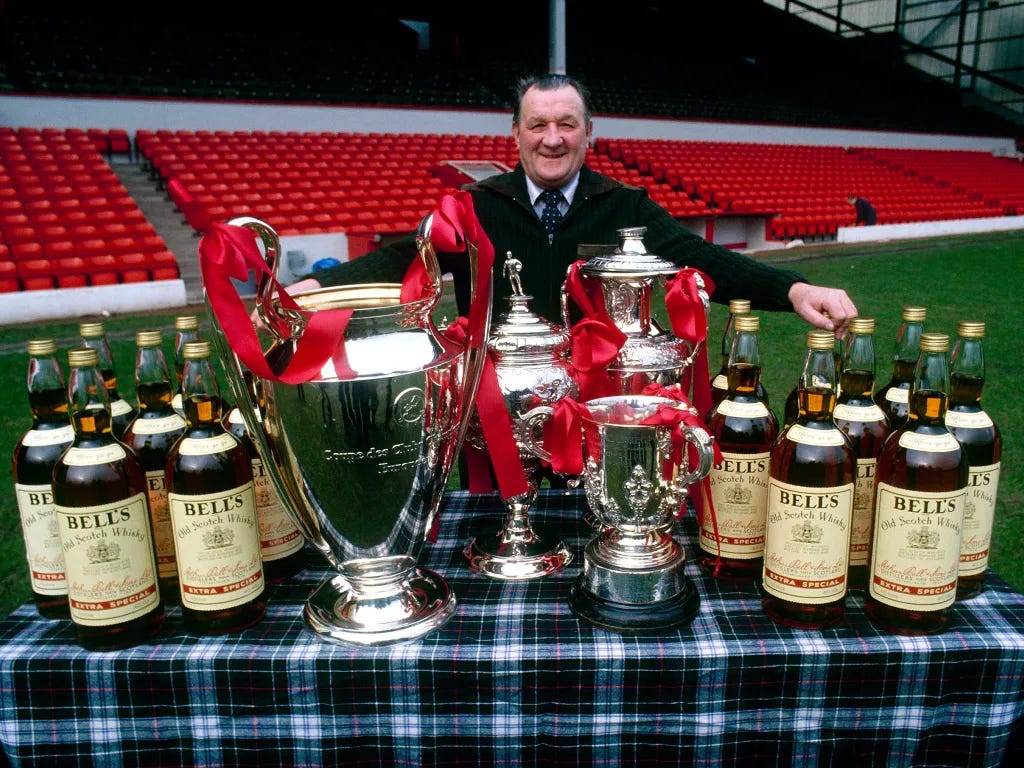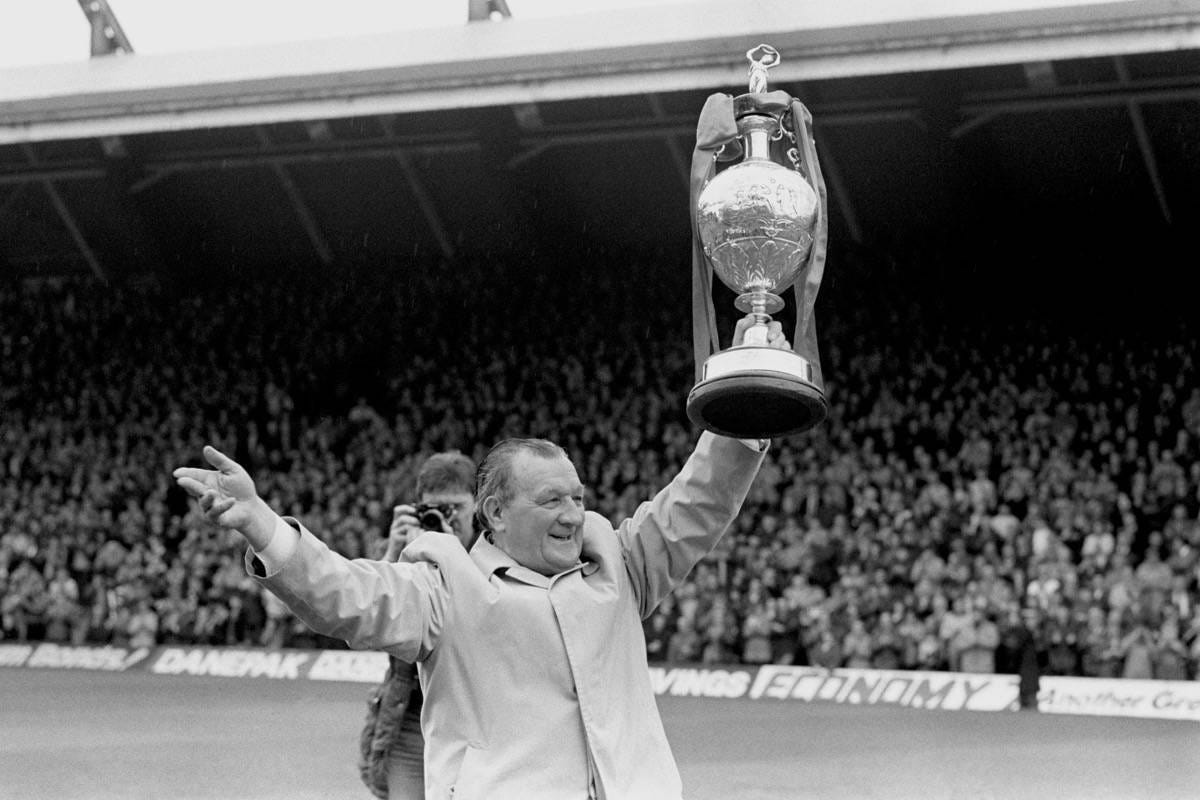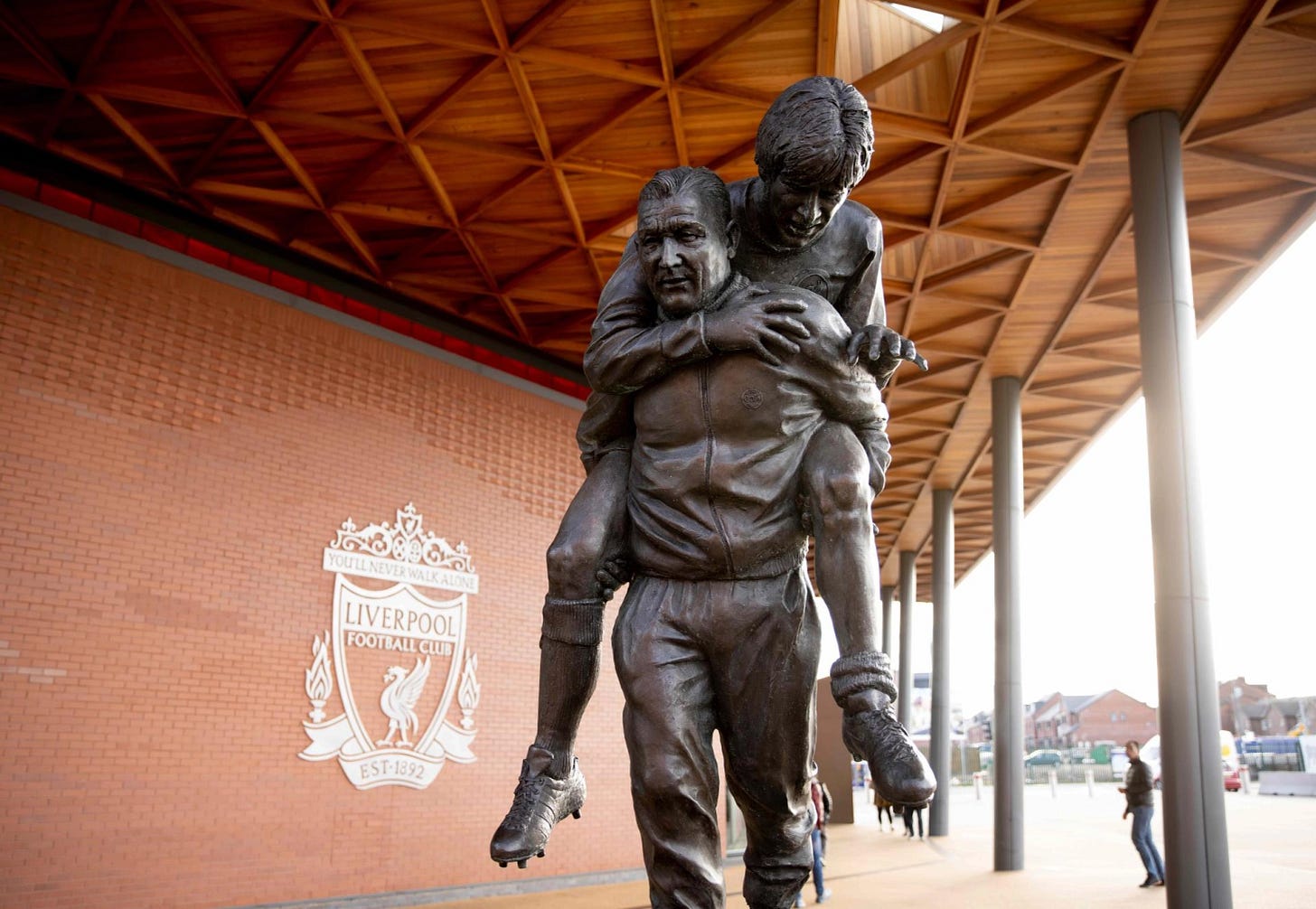Bob Paisley: The Quiet Man Who Shaped a Dynasty
How Bob Paisley Quietly Built the Greatest Team in Europe
Liverpool has had leaders who bellowed from touchlines, managers who carved their presence into history with showmanship and thunder. And then there was Bob Paisley, who barely raised his voice yet built the most formidable era the club has ever known.
I was six when Paisley retired. I didn’t grasp the full scale of his actions, but I could sense his name was different. Spoken softly, always with respect. Revered, but never romanticised. I learned his genius not through live matches or interviews but through VHS tapes played so often that the ribbon wore thin. I found Liverpool’s rhythm in those grainy replays, and at the centre of it all stood Old Bob.
Kenny Dalglish still calls him that. Not out of nostalgia, but familiarity. “Old Bob”, as if he were a neighbour or uncle, someone who popped round with quiet advice and left you a better person. The way Kenny says it, you feel like you knew him. And for Liverpool supporters, we sort of did.
Taking the Job He Never Wanted
When Bill Shankly shocked everyone by stepping down in 1974, the club needed a successor who could carry the weight without collapsing under it. Paisley was not the obvious choice in the eyes of the press. To the club, however, he was the only choice.
He didn’t want it. That is crucial to understand. Paisley would have been happy to remain in the Boot Room, the same quiet fortress where Shankly, Joe Fagan and Reuben Bennett had planned Liverpool’s first rebirth. But he stepped up because the club asked, and because he believed in doing right by Liverpool.
He didn’t talk about legacies. He just got on with the work.
He knew what he was walking into. The shadow of Shankly was long. But Paisley did not try to outshine it. He continued the work with his hands, making subtle but vital adjustments. The football became more fluid. More precise. Still rooted in Shankly’s values, but played with a different rhythm.
From the start, he made bold decisions, not with loud announcements but with clarity. He understood that Shankly’s methods had taken the club to the summit, but they would not keep it there. He needed evolution, not imitation.
Making Great Decisions Without Grandstanding
One of Paisley’s greatest gifts was his ability to see what others missed. He could take a player who had stagnated elsewhere and repurpose him into a Liverpool legend. His work with Ray Kennedy is the perfect example. Signed as a striker, Kennedy was converted into a left-sided midfielder whose presence defined the team's shape for years. That switch did not happen by accident. Paisley saw a certain poise and discipline in Kennedy that suited deeper play.
When Kevin Keegan left for Hamburg, it could have been destabilising. Instead, Paisley calmly replaced him with Kenny Dalglish. Not only did Dalglish fill the gap, but he also elevated the entire system. His link-up with Ian Rush in later seasons would become one of football's most iconic strike partnerships.
Alan Hansen was signed from Partick Thistle, a ball-playing centre back, before the phrase existed. Paisley saw how Hansen’s composure could change how Liverpool built from the back. He was right again.
Even with young talents like Ronnie Whelan and Sammy Lee, Paisley introduced them gradually but with clear faith. They weren’t thrown in. They were placed into the machine with care. When they were ready, they were prepared. There were no experiments, just decisions grounded in experience.
His ability to see beyond a player’s current role or reputation and visualise what they could become in the right system remains one of the greatest hallmarks of his reign. This ability also made Liverpool a destination for ambitious footballers, not just stars looking for a payday.
Football as a Science of the Mind
Paisley did not believe in raw emotion winning matches. He believed in preparation, pattern recognition and calm execution. His sides played with intelligence. They controlled the tempo. They passed with purpose.
While others were shouting, running, and chasing, Liverpool under Paisley would wait, nudge, shift the play, and then strike like a hammer falling in silence.
His team talks were legendary for their brevity. Sometimes he said, “Same again,” or “You know what to do.” The players weren’t left in the dark — they were trusted to do what they’d been drilled to do daily. Paisley believed in preparation over inspiration. He didn’t need to light fires because the room was already glowing.
He once told Ian Rush not to worry about scoring goals, to keep making the right runs. Rush scored a hat-trick that day. There was no overreaction. Just a nod.
Graeme Souness, a player of fire and precision, described Paisley as someone who never needed to say much. When he did speak, you listened. And more importantly, you remembered it forever.
It wasn’t about charisma. It was about clarity.
European Mastery With a Murmur
Paisley didn’t just win at home. He conquered Europe. Three times.
In 1977, Liverpool lifted their first European Cup under his guidance in Rome, confidently beating Borussia Mönchengladbach. A year later, they retained it at Wembley, defeating Club Brugge. Then, in 1981, Real Madrid was swept aside in Paris. Each final had its own character and demands. Paisley adapted every time.
There were no mind games, no excuses, just elite preparation and execution. That’s what made it so powerful. Liverpool walked into these finals not hoping to win but expecting to.
Their ability to switch gears in Europe without changing identity separated Liverpool under Paisley from other successful teams. They did not abandon their principles. They just adapted their tempo.
No other British manager has matched those three European Cups. And Paisley did it in just five years. He didn’t need a complete rebuild every season. He evolved what he had. One piece at a time.
Dominance Without Ego
Six league titles in nine seasons. Three European Cups. Three League Cups. A UEFA Cup. Charity Shields. European Super Cups.
The numbers are astonishing, but how he achieved them matters more.
Paisley did not chase records. He maintained standards. And he never let success inflate the club’s ego. Every trophy was treated as validation of hard work, not a crown to be waved around. That humility, that restraint, came from him.
He was a trained physiotherapist and used that knowledge to inform recovery and rotation long before sports science became the industry it is today. His medical knowledge helped him gauge not just injuries but form and fatigue. His relationship with the squad was clinical in the best sense.
He could spot a half-yard lost in a sprint and know it was time for rest. He could spot a head dropping in training and know it was time for a word. Everything was watched. Quietly, but completely.
A Presence That Outlived the Title
Paisley stepped down in 1983. There was no farewell tour. Just a draw at Aston Villa, and the end of the most quietly dominant era in British football history.
He handed the job to Joe Fagan, another Boot Room graduate, and Liverpool did not skip a beat. Fagan delivered a treble in his first season. That continuity did not happen by accident. Paisley built it into the structure.
Even in retirement, Paisley remained present. He came to training. He chatted with the staff. He offered advice. But he never imposed. He understood that once you hand the reins to someone else, you support, you don’t supervise.
Although he had retired as manager in 1983, his connection to Liverpool remained strong. During the 1985/86 season, he quietly resumed a formal role as an advisor under Kenny Dalglish, who had taken on the enormous challenge of being player-manager. The season ended in glory, with the club lifting both the league title and the FA Cup. Paisley was at Wembley, sat on the bench, watching the team win the one major honour that had eluded him both as a player and a manager. It was a fitting coda to a life in football; not at the centre of attention, but close enough to touch the legacy he helped create.
He passed away in 1996, aged 77, after suffering from Alzheimer’s. It was a loss felt deeply across Liverpool, not just within the club. For so long, he had been a figure of calm, dignity, and relentless excellence that his absence felt surreal.
Statues were built, and gates were named. However, the authentic tribute remains in how the club still operates. The fans still expect not just success but success with purpose.
A Quiet Philosophy That Still Echoes
Paisley’s legacy is not just measured in silverware. It is measured in identity.
The Liverpool we know today, with its emphasis on unity, its style of play built on control and cleverness, and its focus on evolution over revolution, all echo his thinking.
You could see Bob's fingerprints even under Jürgen Klopp, whose personality was louder but whose principles aligned: respect for the shirt, trust in the system, and a sense that football is not won in the tunnel but on the training ground.
Paisley never wrote a book, never became a pundit, and never attempted to mythologise himself. He simply lived the role with integrity and left quietly when he was done.
That is rare. And that is powerful.
A Personal Connection
What stays with me most is how often Kenny Dalglish still talks about him. Not just as a mentor, but almost as a memory shared with all of us. “Old Bob,” he says with a smile. And you can see it all come back to him.
I never met Paisley, but like every Liverpool supporter, I feel like I did; not because of a speech or a statue, but because of what he left behind.
His teams taught me what Liverpool football should look like: intelligent, composed, and relentless. His way of doing things: steady, smart, and understated; still guides how I think about the game, even now.
He didn’t shout. He didn’t dance on touchlines. He just knew. And that was enough.





Great article. When you factor in what the club won when he was a player and a coach it's even more impressive. He's criminally underrated.